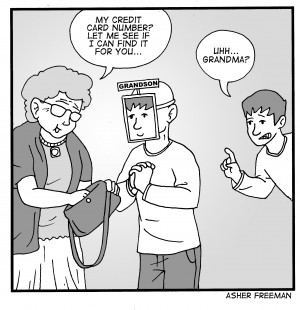 Facebook has revolutionized the way that not only social media works, but even how the entire Internet has developed. While previous social media sites were not tied to actual identity, Facebook has a rule in place that requires users to register with their real name.
Facebook has revolutionized the way that not only social media works, but even how the entire Internet has developed. While previous social media sites were not tied to actual identity, Facebook has a rule in place that requires users to register with their real name.
Recently, the company has decided to makes efforts to enforce this policy, to the annoyance of some people.
The emphasis on weeding out profiles with made-up names will be beneficial for the site.
The rule states: “Facebook is a community where people use their real identities. We require everyone to provide their real names, so you always know who you’re connecting with. This helps keep our community safe.” The policy goes on to state the name used on Facebook should reflect the name found on a credit card, driver’s license or student ID.
Facebook strives to be a trusted site for all its users – including advertisers. One way the site makes money is through advertisements. However, if advertisers do not believe Facebook to be a legitimate site, then it’s possible they will spend their money elsewhere. When Facebook users post fake interests, fake name or fake ages, advertisers cannot accurately target their audiences. If the trend of fakeness continues, advertisers may consider Facebook useless.
Why does this matter for the normal person? Facebook makes money off ads. It’s not too far from the realm of possibility to think Facebook might have to start charging users if it loses its ads.
Then there is the issue of safety. Facebook representatives said requiring a real first and last name allows users to know who they are connecting with.
Some people claim they use fake names or altered versions of their real name in order to make their account more secure. However, Facebook allows for several different levels of security settings that make creating a fake name unnecessary.
In the past few years, Facebook has become much more than just a social media service. Facebook is useful in several ways beyond just connecting with other people.
If we goes to most websites, we can log in via Facebook. That includes news websites like ESPN or the Huffington Post, message boards and even apps to connect people, such as Tinder. Before Facebook, the Internet was almost always anonymous. Even sites like MySpace or AOL Instant Messenger were loosely associated with a person at best. When Facebook came around, it allowed real people to know they were connecting with other real people – which makes the Internet more efficient because we aren’t dealing with some vague unnamed someone.
The main opposition to the enforcement of the rule has come from people who use nicknames or who have created a new identity for themselves, such as drag queens.
Facebook offers users the chance to list an alternate name to the account for anyone who wants to list a nickname.
For those who want to create a new identity, they can create fan pages. This way, they are not breaking Facebook’s rule but can still connect with other people. Fan pages are not quite as personal as profiles, but can connect with an audience. If there are people who do not want to be found or want to be kept anonymous, a site that promotes connections between users is not the place for them.
Other social media outlets are also an option. Twitter allows for interaction and followers within a community. Instagram gives people a platform to share pictures and experiences.
Having a Facebook account is not a right or a necessity, but a decision. No one is required to have an account. Facebook as a platform to create new identities is not the intent of the site.
However, Facebook was created as a way to encourage transparency on the Internet. Ignoring that would take away from what makes Facebook so successful.


